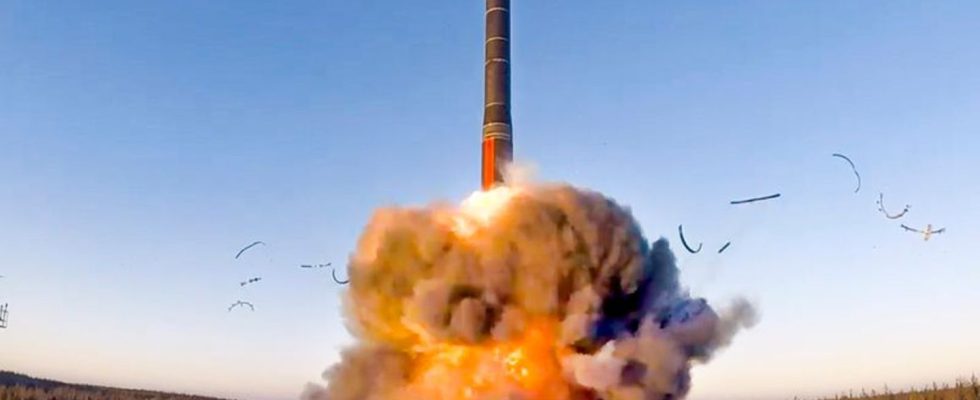conflicts
Peace Researchers: Nuclear-armed states are strengthening their arsenals
An ICBM launches as part of a ground-based test in Russia. photo
© Uncredited/Russian Defense Ministry Press Service/AP/dpa
Russia’s war of aggression against Ukraine and the rhetoric that has accompanied it have fueled fears of nuclear weapons being used. Leading peace researchers are also concerned.
The world’s nuclear powers are investing in modernizing their nuclear arsenals in view of the Ukraine war and the overall deterioration in the security situation around the world. This emerges from the annual report published today by the Stockholm peace research institute Sipri. The total stock of nuclear warheads fell by almost 200 to an estimated 12,512 from the beginning of 2022 to the beginning of 2023. On the other hand, the number of operational nuclear weapons has begun to increase.
The number of nuclear weapons worldwide has been steadily declining for decades. It now accounts for less than a fifth of what was in nuclear arsenals at the height of the Cold War in the 1980s. However, the decline is mainly due to the fact that decommissioned warheads are gradually being dismantled by the leading nuclear powers Russia and the USA.
The peace researchers, on the other hand, see the problem primarily in the warheads that are intended for use. Their number rose year-on-year by 86 to an estimated 9,576. About 2,000 of them were kept on high alert like in the previous year, ie mounted on rockets or stationed at air force bases with nuclear bombers. Almost all of them belong to Russia or the USA.
Tightened nuclear rhetoric
“Global reductions in deployed warheads appear to have stalled and numbers are picking up again,” the Sipri report said. At the same time, both the US and Russia had launched extensive and costly modernization programs.
Peace researchers are alarmed in view of the geopolitical tensions and above all the Russian war of aggression against Ukraine. “Most nuclear-armed states are hardening their rhetoric about the importance of nuclear weapons, and some are even making explicit or implicit threats that they might use them,” Sipri expert Matt Korda said. “This heightened nuclear competition has dramatically increased the risk that nuclear weapons could be used in anger for the first time since World War II.”
Nine nuclear weapon states
According to Sipri, nine countries have nuclear weapons. Russia and the USA remain the countries with by far the largest arsenals: they hold almost 90 percent of all nuclear warheads. Behind them, China has long moved up to third place. Sipri now estimates the stocks of the People’s Republic at 410 warheads, 60 more than a year earlier – and the trend is rising.
“China has begun a significant expansion of its nuclear arsenal,” noted Sipri expert Hans M. Kristensen. It is becoming increasingly difficult to reconcile this trend with Beijing’s stated goal of having only a minimum of nuclear power to maintain national security.
According to Sipri, France, Great Britain, Pakistan and India as well as Israel and North Korea also have nuclear weapons, Germany does not have such weapons.
Setbacks for nuclear diplomacy in Ukraine war
Nuclear diplomacy has suffered major setbacks since Russia invaded Ukraine in February 2022. In February 2023, Kremlin chief Vladimir Putin suspended the “New Start” disarmament treaty – the last major nuclear disarmament treaty with the United States. Talks about a follow-up agreement for the contract, which expires in 2026, have also been put on hold.
In addition, negotiations to revive the nuclear deal with Iran are overshadowed by Iran’s military support for Russian forces in Ukraine and the country’s political situation. A revival of the agreement currently seems increasingly unlikely, estimated Sipri.
“There is an urgent need to restore nuclear diplomacy and strengthen international nuclear weapons controls,” said Sipri director Dan Smith. In times of geopolitical tensions, distrust and the switched off communication channels between nuclear-armed rivals, the risk of misjudgements, misunderstandings or accidents is unacceptably high.
Governments must find ways to work together to calm tensions, slow the arms race and deal with the worsening consequences of the climate crisis and rising world hunger. Smith made it clear: “We are drifting into one of the most dangerous times in human history.”

